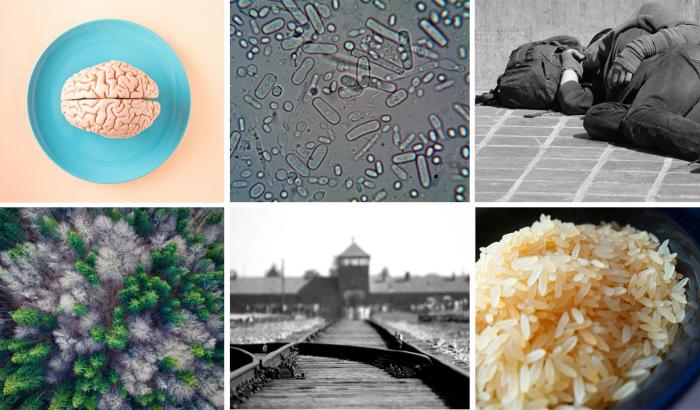
Reinhard Schneider, Universität Luxemburg
Prof. Reinhard Schneider, LCSB, Universität Luxemburg
This year's Nobel Prize in Chemistry goes to three protein researchers: David Baker (USA), Demis Hassabis (UK) and John Jumper (UK). Hassabis and Jumper have achieved what researchers have been dreaming of for 50 years: being able to predict the structure of proteins thanks to the AI system AlphaFold. Baker is being honoured for the design and construction of completely new proteins.
Proteins are strands of amino acid molecules that are lined up like a string of pearls. They fold together in three-dimensional space. How exactly they assemble and which 3D structures they produce is determined by the sequence and type of amino acids. Thanks to the work of Demis Hassabi (UK) and John Jumper (UK), these 3D structures can now be predicted.
But it doesn't stop there. If you need a specific 3D structure, you could go to the lab and have the right amino acid sequence computed to give exactly this 3D shape. In this way, a newly invented protein can be produced artificially: this is called protein design. And that's precisely the aim of David Baker's work.
Can you explain today's Nobel Prize in a few sentences? To what extent is it justified?
Prof Schneider: “It's all about protein research. Proteins are strands of 20 amino acid molecules that are lined up like a string of pearls and fold together in three-dimensional space. They are the workers and building blocks of our body and can be found everywhere, as enzymes, messenger substances, hormones, in tissues...
Initially, people tried to find out their structure in order to understand how they function. They worked on the problem for 50 to 60 years with statistics etc., but at some point, they reached a knowledge plateau. Then, in 2018, the group around DeepMind (Google) came along and developed the AI programme AlphaFold. AlphaFold uses advanced machine learning techniques (Deep Learning) to predict the three-dimensional structure of proteins from their amino acid sequence. Version 2 was released in 2020, and it has been a real breakthrough. The predictions are as good as only experimental methods can achieve. This has turned the world upside down!”
What influence did protein research have on your own career?
Prof Schneider: "I wrote my bachelor thesis on the prediction of secondary structures. At that time, however, there were nowhere near enough sequences to make adequate predictions. A colleague then applied neuronal networks to our work, and that got us further. I subsequently founded a bioinformatics company, Lion Bioscience, which helps to find chemical structures that have a physiological effect in the body and are therefore potential candidates for new therapeutic compounds. We selected proteins from public databases that could be interesting for drug research.”
What are the opportunities and risks of this kind of research?
Prof Schneider: “The opportunities are enormous, especially in terms of research into new drugs and materials. Think of plastic, for example: could a substitute be created?
The next stage would be to decode protein complexes such as those of a cell nucleus: how do proteins bind together? And if you go one step further: could you design completely new proteins and assemble them as protein complexes?
As far as AlphaFold is concerned, such a tool can be used anywhere (speech recognition, social media analyses, translations, etc.). The areas of application are very broad, and the opportunities are far from exhausted.
Of course, such research also harbours certain risks: Bioterrorism, among others. Dangerous, toxic proteins could be produced artificially in the future, or pathogens (such as viruses) could be made more dangerous. If one day synthetic proteins are brought out, the market will have to be regulated, just as with new chemicals. There is still a lot of work ahead of us to provide a framework for this very new research."
Author: Diane Bertel
Editor: Lucie Zeches (FNR)
What kind of protein research like this is done in Luxembourg? Sophia Loizidou and Prof Tkatchenko, from the University of Luxembourg, explain their work to us.
Sophia Loizidou: “The building blocks of proteins are the amino acids, which consist of the backbone and the sidechains. The backbone consists of chemical bonds which can rotate around their axis and the angles formed are referred to as the dihedral angles. An important part of the protein structure prediction problem consists of understanding the behavior of the dihedral angles. We propose statistical methods to quantify the uncertainty behind predicted conformations. Our goal is to complement the work of AlphaFold. According to a recent Nature Methods paper, “distributions of conformations are the future of structural biology”. For this, we use tools from directional statistics, which is one of our main areas of research. Directional statistics deal with data on special supports such as the circle or sphere. The two dihedral angles can be modelled on the torus, which is the product of two circles.”
Prof. Tkatchenko: „What we do in biomolecular dynamics is related to the Nobel prize in chemistry. Basically, we take structures from AphaFold and make them move under realistic conditions (temperature, pressure, pH, etc). The protein functionality and drug-protein interactions come from those motions. Actually, we are already integrating AlphaFold-like approaches and our molecular dynamics engines with a startup in Boston.”




